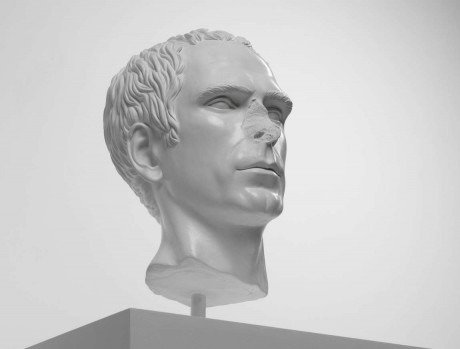Jonathan Monk
dal 21/5/2013 al 18/7/2013
Segnalato da
21/5/2013
Jonathan Monk
Lisson Gallery Milan, Milano
Per la mostra milanese Monk ha volto lo sguardo all'arte greco-romana. Ne sono risultati 5 ritratti scultorei identici, a grandezza naturale. L'artista ha poi invitato alcuni grandi esponenti dell'Arte Povera, da Jannis Kounellis a Gilberto Zorio, fino a Emilio Prini, a rimuoverne il naso.

Monk often makes work about other work: an art of appropriation, adaptation,
reworking and revisiting. Often referencing Conceptual, Pop and Minimalist art,
Monk confronts the contemporary dilemma of how to make art in the face of art
history: how to be original when seemingly all questions have been posed.
However, in this act of examination, modification and re-presenting, Monk
succeeds in creating something new. His originality lies in the space between the
idea inherent in the new object and its actual objecthood. As Monk confirms,
“...the idea of an original and a copy of an original are two very different things.”
For his Lisson Gallery Milan exhibition, Monk turns his gaze to Graeco-Roman art.
Inspired by the Italian setting for the show, he has had his own head painstakingly
sculpted and cast in Jesmonite polished to resemble marble. Five identical,
fractionally larger than life-size busts have been created and each called
Senza Titolo. With stylized hair and an imperious gaze, they resemble the
idealized portrait statuary of ancient Rome.
Each bust is placed on a high plinth
and stares down at the spectator. The figure of the artist appears exalted but this
is not a simple exercise in egoism. In order for the works to be completed, Monk
invited different artists from the Arte Povera generation to break his nose.
Kounellis, Calzolari, Prini and Zorio all agreed to deface a bust by giving Monk’s
likeness a good whack with a specially selected hammer and knocking the nose
off. Zorio even added a small gob of yellow modeling clay to the broken nose.
In this moment of destruction the work comes into existence: a metamorphosis
that eliminates the single figure of the artist and echoes the ambiguity of the non-
title of each work.
Covered Motorbike 2013 is the largest bronze sculpture that Monk has ever
produced. Normal associations of speed or the open road are belied and instead
Monk presents a large, heavy and inert object. The bike has vanished, hidden
beneath the tarpaulin. The subject of the work remains secret. An innocuous
and ubiquitous sight, especially in Milan, the covered bike has been glorified and
monumentalized. Cast in bronze, references to great classical art as well as the
reclining nudes of, for example, Henry Moore are inescapable.
The Void 2013 is a marble plaque that depicts the back of a Piaggio Ape three-
wheeled truck - the kind of truck often seen zooming down only marginally wider
and labyrinthine Milanese streets. Whilst at Lisson Gallery one day Monk over
heard two technicians discussing the possibility of fitting the ‘void’ into the back of
a van and imagined the van to be a Piaggio Ape, which is both large and small at
the same time and thus has ample room for a void. Aggrandized in marble, this is
Monk’s homage to this simple and honest means of transportation.
For press information and images please contact
Pelham Communications (International)
Amy Sutcliffe and Victoria Wedderburn
Tel: +44 20 8969 3959
Email: amys@pelhamcommunications.com -
victoria@pelhamcommunications.com
Paola C Manfredi Studio (Italy)
Tel: +39 02 87 23 80
E: press@paolamanfredi.com
Opening mercoledi' 22 maggio ore 19 - 21
Lisson Gallery Milan
via Zenale, 3 Milano
Orari: Lunedì - Venerdì 9.30–13.00 e 15.00–18.00
Ingresso libero



